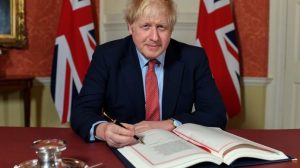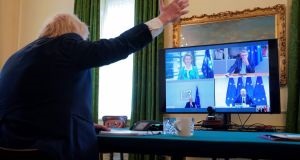The year is half completed and a deadline for an extension to the Transition Period looms.
It may have been a madly hectic and massively changing six months for most of us – and the world economy – due to the Coronavirus Pandemic, but it’s been a slow half year for one set of the UK’s negotiation discussions…
What!? Yes this is nothing to do with Covid-19 and all to do with the much-forgotten ‘Transition Period’ after Brexit, 11 months in which the UK is no longer a member of the EU but continues to be subject to EU rules and remains a member of the single market and customs union, along with the security arrangements. Freedom of movement remains (in theory, but not at all now we have Covid-19) and citizens’ rights are unaffected. There is no more Nigel Farage and the other UK MEPs in the European Parliament, no UK commissioner and UK ministers no longer attend meetings of the European Council.
Let’s recap: Brexit = divorce bill, Transition Period = time to get a new deal done, and Trade Deal = the new bipartite relationship between the UK and the EU.
A quick quiz: I suspect you know who the EU’s chief negotiator is, but who is the UK’s current chief negotiator? Yup, like me, most of you won’t know who it is, and we can be partially forgiven as there have been quite a few… See bottom of article for the answer.
After three extensions, the UK formally left the EU on 31st January 2020. Theresa May’s Withdrawal Agreement (WA) agreed 21 months for this transition, but after the Brexit delays, we now have the last 11 months of this year for negotiations between the UK govt and the EU to settle the terms of a new trade deal, inter alia all the other trade deals we now have to do, and in particular the USA. Or no deal at all, possibly with anyone new…
As of 16th June the UK had agreed 201 deals, with a further 161 under

Boris Johnson signing the Brexit withdrawal agreement.
discussion, of which only Canada is a fellow non-EU G8 country, the others being Japan, Russia and USA. The UK says its ‘priority is to launch negotiations with the EU, the US, Australia, New Zealand and Japan’.
The UK and Japan have agreed to negotiate a new bilateral deal using the existing EU agreement as a base (but these talks have been paused since 13 May for a public consultation), and we have signed Mutual Recognition Agreements with Australia, New Zealand and USA2.
In my view, the Brexit negotiations were ‘won’ by the EU. One aspect of that win is that the EU said it will not negotiate details of new arrangements with the UK until it ceased to be an EU member. I am sure it would have been possible to do so, after all – to use the most common metaphor used in those talks – a post-divorce deal is sorted out before the final divorce, not afterwards. ‘You want half the assets and to see the kids every two weeks? I’m not discussing that you’ve signed!’ But no, instead the EU chose to inflict the delay in the start of trade talks on the UK.
New arrangements with the EU are due start on 1st Jan 2021, and ‘officially’ if the UK wants to extend the transition period (of up to two years under the WA), it needs to have asked for that by 1st July 2020, only a few days after we publish this article. ‘Officially’ the UK does not want to do extend, and has even encoded this in law, and reinforced this in a press release from the Withdrawal Agreement Joint Committee (WAJC) as recently as 12 June. Yet, both sides are taking the discussions ‘real slow’.
Negotiation Tactics – aka the development of Relative Power – are being used extensively here. For those in the know, the Power Tactics being used are pretty standard ones. Here is a quick review of the main ones:

Sassoli, Michel Barnier and Charles Michel.
- Use the big guns occasionally: Boris Johnson met Charles Michel, Ursula von der Leyen, and David Sassoli online for ‘high level’ talks on 15 June, and even before they met they said they’d accelerate things, with 5 new rounds of talks starting on 29 June. They agreed to get on with it.
- Best alternative (BATNA): The threat to walk away. In this case it means a ‘No Trade Deal’ end to 2020 and the UK moving to WTO (World Trade Organisation) rules, although N.Ireland has a separate outcome under the Northern Ireland Protocol. After that the UK can continue negotiating. Also comparisons with other deals and bad treatment/breach of spirit used by UK.
- Competition to the deal: used by both sides here e.g. by the UK use of USA as if it were some kind of alternative, and the EU using its other trade deals.
- Timing: Combined with BATNA, the UK have told the EU there will be ‘no extension’. This is getting minds to focus on working faster towards a deal, and is considered a genuine position.
- Authority: the latest Conservative manifesto aimed for a relatively loose free trade agreement, giving Boris and his team strength to say they can’t soften their position.
- Posturing Language: using words like ‘officially’ (which surely means we will do something else unofficial), ‘partial deal’, ‘very difficult’, ‘repeatedly ruled out’, no/some ‘scope for compromise’ (aka concede), ‘level playing field’ and ‘fairness’ (using ethics as a tactic), which leads me to…..
- Morality: keeping or breaching promises already made, a tactic used by each side. The UK called the EU on this in May with the accusation that it was keeping to the spirit of the agreement and treating the UK worse than any other trade deal counterparty.
- Meeting Locations: we’re not just meeting in Brussels this time, but online then in each city.
- Proximity and uniqueness used by EU e.g. fish, Financial Services/banking.
- Precedent: the UK says ‘you’ve already agreed this and that with us and in other trade deals with the EU
- Internal conflict – the separate factions of the Conservative Party now seem to be arguing again over whether the UK should be an EU-partner (aka protectionism) or a free agent.
- Time: by each on the other, and by the UK on itself, with some asking for an extension because they say they can’t cope with the post-EU future and deal with the damage from Covid-19. The ‘slow clock’ is our concept for how the pace starts slowly. There is always a load of faffing about until the 11th hour minute, and we’re in the middle of that now – several rounds of talks have made next to no progress in recent weeks. One concept that we share in our negotiation coaching is that of accelerating time value, typically from a slow start. A day now does not seem to be worth or cost much, but in mid-December 2020 it will seem to have passed very quickly and much will be expected of each day.
- Trading concessions to do the deal: the haggling has started: fish for finance; strong or weak border checks; the location of those borders and checks in England or N.Ireland; and protecting the Good Friday Agreement (which both sides say they are keen to do).
We can all learn a lot from watching others negotiate, whether they do it well or badly. This will be one to watch closely from here on, and we can all apply the learnings to our own work with suitable translations.
If I have one thing to suggest we watch it will be the degree to which either side deviates from what it says is non-negotiable, and in particular the emotional effect this has on both sides.
By Ewan Pearson
PS: Answer: The UK’s chief negotiator is David Frost (and for the EU it’s still good ol’ Michel Barnier).
Sources:
- https://www.gov.uk/guidance/uk-trade-agreements-with-non-eu-countries
- A mutual recognition agreement (MRA) is one in which countries recognise the results of one another’s conformity assessments.
- https://www.instituteforgovernment.org.uk/explainers/brexit-transition-period
Download a PDF version of this article here: Half-time oranges in a slow start to the year

